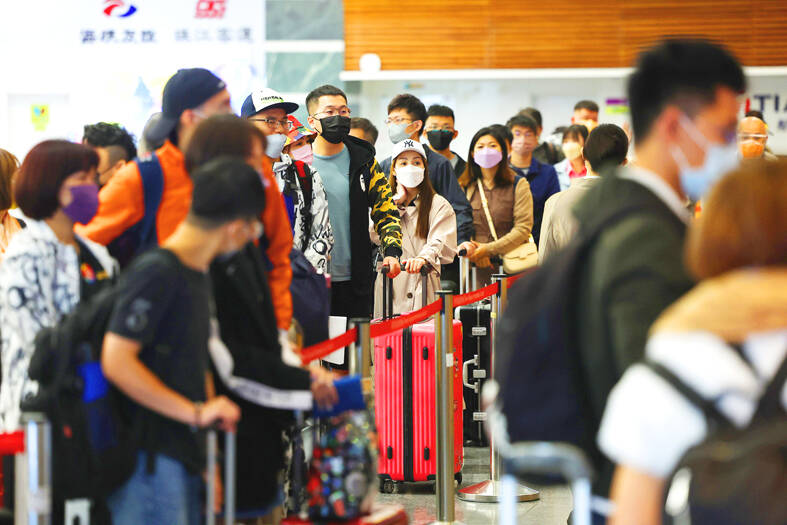Passenger arrivals in Taiwan have risen to about 30 percent of pre-COVID-19 pandemic levels, airport data showed, with an expert predicting it could reach 40 percent by the end of the year.
Since the reopening of national borders on Oct. 16, travel to Taiwan has been slowly resuming.
Incoming traveler numbers this month are expected to reach 26 to 31 percent of pre-pandemic levels, Providence University Department of Tourism associate professor Huang Cheng-tsung (黃正聰) said, citing estimates from Taiwan Taoyuan International Airport.

Photo: CNA
However, Huang said he believed it could reach 40 percent before the end of the year.
The largest number of travelers came from Vietnam at 16,000, followed by the US at 10,030 and Japan at 9,625, Tourism Bureau figures from October showed.
Travel to Taiwan has tripled since October, Hong Kong-based travel firm Klook said at an event on Wednesday announcing the results of a survey on travel habits in Asia.
Travelers from Singapore held the top spot, followed by South Korea and the US, its survey showed.
Travel from Japan and South Korea, the origin of most arrivals before the pandemic, has not yet fully recovered, it said.
Now that the pandemic is subsiding, people are looking to take full advantage of their newfound ability to travel by taking longer trips, planning in advance and spending more, Klook Taiwan general manager Emma Lee (李雅寧) said.
Taiwanese are increasingly looking outside of Asia and are seeking more unique travel experiences, she said.
Although 80 percent of respondents reported anxiety about traveling abroad next year, 90 percent said they look forward to it and nearly 20 percent have already booked tickets, the survey showed.
The most popular attraction is the Shibuya SKY observation tower in Tokyo, while the hottest package is a one-day tour of floating markets in Bangkok, Klook said.
As for travelers to Taiwan, more than half are coming for the food, Lee said.
Promoting exhibition tie-ups with large international events could draw more travelers, she said, citing as an example “Avatar: The Experience” at Singapore’s Gardens by the Bay.
Traveling by car has also become easier, after Taiwan and South Korea signed a driver’s license reciprocity agreement, Klook associate director of business development Ryan Tsai (蔡岳廷) said, adding that demand for car rentals has soared among South Korean tourists in Taiwan.
Taiwanese car rental firms have even started purchasing more Hyundai vehicles to meet the needs of this growing market, he said.
One surprising piece of feedback from these visitors has been that driving in Taiwan is safer than in South Korea, he added.

A strong continental cold air mass is to bring pollutants to Taiwan from tomorrow, the Ministry of Environment said today, as it issued an “orange” air quality alert for most of the country. All of Taiwan except for Hualien and Taitung counties is to be under an “orange” air quality alert tomorrow, indicating air quality that is unhealthy for sensitive groups. In China, areas from Shandong to Shanghai have been enveloped in haze since Saturday, the ministry said in a news release. Yesterday, hourly concentrations of PM2.5 in these areas ranged from 65 to 160 micrograms per cubic meter (mg/m³), and pollutants were

Taiwan’s armed forces have established response protocols for a wide range of sudden contingencies, including the “Wan Chun Plan” to protect the head of state, the Ministry of Defense (MND) said today. After US President Donald Trump on Saturday launched a series of airstrikes in Venezuela and kidnapped Venezuelan President Nicolas Maduro, concerns have been raised as to whether China would launch a similar “decapitation strike” on Taiwan. The armed forces regularly coordinate with relevant agencies and practice drills to ensure preparedness for a wide range of scenarios, Vice Minister of National Defense Hsu Szu-chien (徐斯儉) told reporters before a

EVA Airways on Saturday said that it had suspended a pilot and opened an investigation after he allegedly lost his temper and punched the first officer several times as their plane was taxiing before takeoff at Los Angeles International Airport. According to a report published on Thursday by The Reporter, the incident occurred after the flight’s Malaysian first officer tried to warn the Taiwanese pilot, surnamed Wen (文), that he was taxiing faster than the speed limit of 30 knots (55.6kph). After alerting the pilot several times without response, the first officer manually applied the brakes in accordance with standard operating

The New Taipei City Social Welfare Department on Thursday celebrated Paralympic competitor Chen Tzu-wei (張孜維), who received last year’s national Golden Eagle award for exemplary achievement by Taiwanese with disabilities. Chen, who suffers from childhood-onset muscular dystrophy, did not attend the first award ceremony held by the Ministry of Health and Welfare in November due to illness. Chen was formally presented with the award at the department, where he gave thanks to government workers for supporting his education and livelihood, the department said in a statement. Chen was raised by the Ai-hsin Home for Persons with Disabilities in the city’s Bali District (八里)